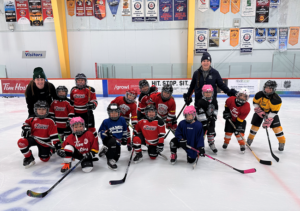Mentorship program for female hockey players launched at Little NHL

By Sam Laskaris
MISSISSAUGA – The province’s largest Indigenous youth hockey tournament has had various milestones and accomplishments in its 49-year history.
Another first, however, was achieved on Mar. 15 at this year’s Little Native Hockey League tournament, which has been running this week in Mississauga.
Several female tournament competitors also took part in the official launch of Hoc’Kwe, a mentorship program for Indigenous girls in hockey, run by a pair of high-profile elite females.
The program is run by Kelly Babstock and Kalley Armstrong.
Babstock is a member of Wiikwemkoong Unceded Territory who is playing professionally in the Premier Hockey Federation with the New Jersey-based Metropolitan Riveters. And Armstrong is the granddaughter of the late George Armstrong, a legendary Toronto Maple Leafs’ captain.
A former captain of the Harvard University women’s hockey squad, Kalley Armstrong is now also running her own skills development/coaching program titled Armstrong Hockey.
Hoc’Kwe is a play on words to make the program name sound like the word hockey. In Ojibwe, Kwe means woman.
Hoc’Kwe was launched Wednesday with three sessions at the tournament, which is often simply called the Little NHL.
Hour-long sessions were held for those in Under 7-9, Under 11-13, and Under 15-18 age groupings.
Babstock and Armstrong are hoping to begin booking mentorship sessions now in various Indigenous communities throughout Ontario.
“This week is kind of our launch,” Armstrong said. “We’re just kind of getting ourselves out there, getting some contacts, and getting our names out there. Then hopefully we can start going into communities and also running sessions online so we can have a further reach.”
The Hoc’Kwe plan is to travel to as many communities as possible in Ontario.
“Hopefully we can cover most of the province,” Armstrong said. “Especially up north. We really want to go up north.”
Babstock, a 30-year-old who turned pro in 2015, said her hockey role models while growing up were all male, that’s why she believes the Hoc’Kwe program will serve a very useful purpose.
“It definitely is huge for the girls to have women coaches that they can connect with,” she said. “I never had a woman coach in my hockey career. I know it would have been different if I did because you have that connection. And it’s just great to see these girls look up to us as role models.”
Babstock is currently living in Norwalk, Connecticut, but she plans to attend numerous upcoming sessions with Hoc’Kwe in Ontario.
“In spring/summer, that’s the goal, to commit my time for these gals,” she said. “And then through hockey season, through winter and fall, we’re planning to do some cool things for the older gals like team Zooms.”
Babstock added plenty of young Indigenous female players have loads of potential.
“A lot of the girls – they have tons of talent,” she said. “And we’re here to motivate and be there along the way.”
Armstrong, a 32-year-old who is living in London, Ont., where she is also finishing off her PhD requirements at Western University, is happy to do her part to further the careers of young players.
“I never had the opportunity to play in the Little NHL as a kid,” she said. “To see all the girls playing here now is super inspiring for me to see. If I can give back to the youth in any way, and help them with their futures in any way, whether it’s in hockey or with life, whatever we can do – mentor them and help them through – we want to be a resource for them.”
A total of 184 squads are competing in this year’s Little NHL. Tournament action concludes today (Thursday).


